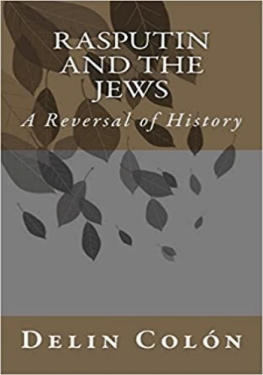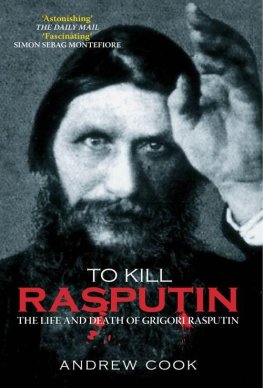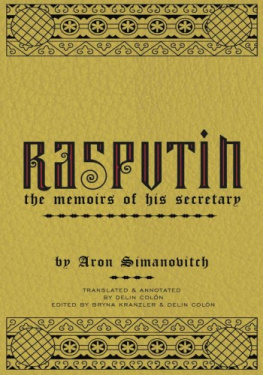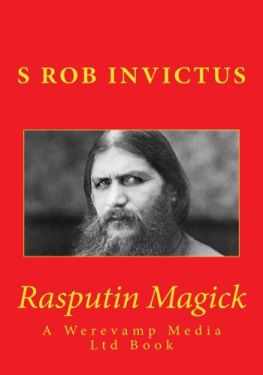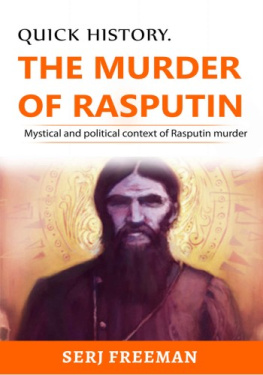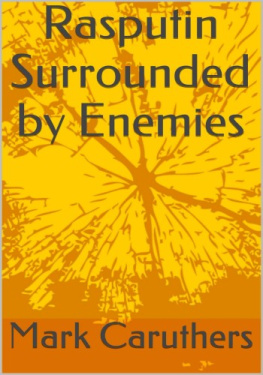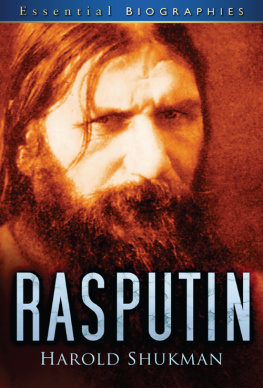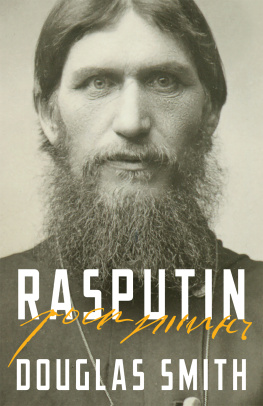Dedication
This book is dedicated to
t he memory of my father,
Alex Linowitz,
To my late son, Willy Graves,
and to my loving husband, David,
who encouraged me to write it.
Rasputin and The Jews |
A R e versal of History |
April, 2010 Delin Coln |
By Delin Coln |
An account of Rasputin as a healer, humanitarian, equal rights activist and man of God, and why he was so vilified by the aristocracy that their libelous and slanderous rumors became accepted as history. |
Contents
Introduction
Important Persons List
I- Purpose
II- Ant i-Semitism in Tsarist Russia
III- Th e Quotas and The Pogroms
IV- Marya Ra sputins View
V- Aron Simanovitchs Perspective
VI- Rasputin the Healer
VII- Man of Faith
VI II- Rasputins Politics
IX- Protector of the Jews
X- What Became of Them
XI- Conclusions
Bibliography
Foo tnotes
Introduction
This small tome is intended to vindicate Grigory Efimovitch Rasputin (born approximately ; died 1916), spiritual advisor to the last Tsar and Tsarina of Russia . It means to debunk all of the outrageous rumors perpetrated by a bigoted, small-minded, self-absorbed society. If you a re looking for a list his debauchery, sins, or crimes, you wont find them here , for there exists no evidence of those, other than rumors . If youre seeking the gory description of his brutal murder, you wont find it here. And if you want to establish a link between Rasputin and the fall of the Rom anov Empire, you wont find any, because there is none.
What you will find is testimony from many who knew him, including his enemies, regarding his humanitarian activities. You will find accounts of his aid to the poor and the ill and his endless efforts to avoid war and its needless cost of lives. You will find substantial evidence of his aid to Russian Jewry and his attempts to obtain equal rights for this group, which was Russias most severely oppressed and restricted population.
But, most of all, you will find that what has passed as history , for a century , was not the truth, which exemplifies how history is written by the powerful not by the oppressed.
Important Persons
Beilis, Mendel Jewish guard of a brickyard, falsely accused of ritual murder
Bonch-Bruevich, Vladimir expert on Russian sectarianism
Gapon, Father George Priest who led workers presenting a petition for better conditions and pay
Gilliard, Pierre Tutor to the royal children
Gruzenberg, Oskar O. Jewish defense lawyer, served as counsel for Mendel Beilis (also Grusenberg)
Guseva, Chionya religious fanatic who tried to assassinate Rasputin
Khvostov, Alexei anti-Semitic Minister of Internal Affairs from 1915-1916
Kokovtsev Minister of Finance, then Prime Minister from 1911-1914
Rasputin, Dmitri (Mitya) Grigorys son
Rasputin, Grigory Efimovitch wandering spiritual pilgrim who served as spiritual advisor to the Tsar
Rasputin, Matryona (Marya) Grigorys elder daughter
Rasputin, Proskovia Grigorys wife
Rasputin, Varvara (Varya) Grigorys younger daughter
Romanov, Tsar Nicholas II son of Tsar Alexander III
Romanov, Tsarina Alexandra wife of Tsar Nicholas II
Romanov, Tsarevitch Alexei son of Tsar Nicholas II, heir to the throne
Romanov, Grand Duke Nikolai Nikolayevitch uncle to Nicholas II, Commander-in-Chief of Russian Armies
Ruzsky, Nikolai General of the Third Army, Commander-in-Chief of the Northern Front
Sazanov, Sergei Minister of Foreign Affairs
Schlegovitov Chairman of the Council of State
Simanovitch, Aron Jewish secretary to Rasputin, jeweler by trade
Sliosberg, Genrikh (also Henry Sliozberg) Jewish attorney, administrative law advisor to Minister of the Interior
Spiridovitch, General Alexandre Chief of the Tsars Secret Police
Stolypin Prime Minister 1906-1911
Sturmer Prime Minister , Minister of the Interior and Foreign Affairs
Vyrubova, Anna lady-in-waiting, confidante and best friend of Tsarina Alexandra
Witte, Count Sergei Prime Minister from 1905-1906, also Finance Minister and served under Tsar Alexander III
Yanushkevitch General and Military Chief of Staff
Chapter 1 Purpose
Grigory Efimovich Rasputin-Novy has been unfairly maligned for nearly a century, and all because history is written by the politically powerful to whom it was beneficial t o record the rumors, myths and exaggerations surrounding this controversial figure. The people Rasputin helped the underdogs of society, the Jews, peasants, and poverty-stricken were not in a position to speak up or even to be believed. Just as Russia wanted to blame the Jews for its ills and lost battles, so did they want to blame Rasputin, rather than the weak-willed Tsar Nicholas II, for the downfall of the Romanov Empire . The long perpetuated image of Rasputin is of a man who committed evil for the sake of evil alone. Naturally, the largely anti-Semitic aristocracy would think it evil to champion the cause of the oppressed Russian peasants and especially the Jews.
Although most records of his good works and petitions were destroyed by his allies to avoid persecution by the tsarist government or the Provisional Government that followed it, some accounts of his efforts can be found in the memoirs of his Jewish secretary, Aron Simanovitch, in the biographies of her father by Marya Rasputin, in the memoirs of Mme Vyrubova (the Tsarinas lady-in-waiting) and General Spiridovitch (Chief of the Tsars secret police), and in Edvard Radzinskys The Rasp utin File, among many others.
Both Rasputins daughter and secretary , in addition to numerous others, describe him as a man of God, as an empathic and herbal healer, as a man of peace wishing to avoid war at all costs, and as a champion of equal rights for all Russian citizens, regardless of their faith or background.
Simanovitchs account is often discredited due to the inclusion in his memoirs of bizarre court gossip and exaggeration of his own importance in the court , although the cases of Rasputin aiding Jews are substantiated by many reliable sources and are indisputable. Simanovitch has also been dismissed because, although he was a jeweler, he also ran gambling parlors. And he has been disregarded because he was a Jew who, through his ten year association with Rasputin, had to resort to bribing officials to save the careers, families, homes, educations, and lives of countless Russian Jews who, at that time (and for centuries before) were denied basic human rights.
Before moving to Saint Petersburg, Simanovitch and his family lived in Kiev where he owned a jewelry store. In 1905, as in many other times and places, the military conducted a pogrom (an organized massacre of Jews and destruction of their homes and property) in Kiev. Simanovitch had been in St. Petersburg at the time, but rushed back to Kiev. His shop was ransacked, but his immediate family was spared, owing to the fact that he paid the chief of police for protection. As he and his family were given safe conduct out of Kiev, he was shaken by the sight of his dead friends and neighbors whod been slaughtered outside the synagogue after a holy service. He saw corpses, burnt houses and broken windows. At that moment, he vowed to do what he could to acquire equal rights for Jews and abolish this terror. He saw his association with Rasputin as a means to this end.
In order to understand who the truly evil ones are, and the underlying causes of Rasputins benevolence to Russian Jews, we need to take a brief look at how tsarist Russia treated its Jewish population.
Chapter II Anti-Semitism in Tsarist Russia
Next page
